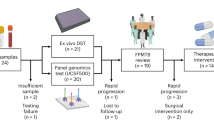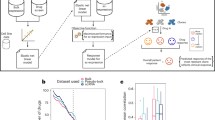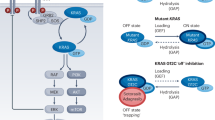Abstract
Drug resistance in epithelial ovarian cancer (EOC) limits the efficacy of therapies for this malignancy. This phenomenon might be partially explained by strong inter-individual genomic heterogeneity. Single nucleotide polymorphisms (SNPs) located in specific genes involved in platinum-based drugs inactivation and the metabolism and extrusion of taxanes could be relevant in terms of drugs response prediction. In this paper, we review candidates for genetic markers of treatment outcomes in ovarian cancer. Although an association between SNPs and response to chemotherapy has been detected in several studies, no clear conclusions can be drawn because of conflicting results. Genetic variants in determining response to chemotherapy and clinical outcome need to be clarified in EOC to allow stratification of patients, which would help optimize therapy.
This is a preview of subscription content, access via your institution
Access options
Subscribe to this journal
Receive 6 print issues and online access
$259.00 per year
only $43.17 per issue
Buy this article
- Purchase on Springer Link
- Instant access to full article PDF
Prices may be subject to local taxes which are calculated during checkout
Similar content being viewed by others
References
Siegel R, Naishadham D, Jemal A . Cancer statistics, 2013. CA Cancer J Clin 2013; 63: 11–30.
Bast RC Jr . Molecular approaches to personalizing management of ovarian cancer. Ann Oncol 2011; 22: viii5–viii15.
Cannistra SA . Cancer of the ovary. N Engl J Med 2004; 351: 2519–2529.
Bolton KL, Ganda C, Berchuck A, Pharaoh PD, Gayther SA . Role of common genetic variants in ovarian cancer susceptibility and outcome: progress to date from the Ovarian Cancer Association Consortium (OCAC). J Intern Med 2012; 271: 366–378.
Paugh SW, Stocco G, McCorkle JR, Diouf B, Crews KR, Evans WE . Cancer pharmacogenomics. Clin Pharmacol Ther 2011; 90: 461–466.
Abecasis GR, Altshuler D, Auton A, Brooks LD, Durbin RM, Gibbs RA et al. A map of human genome variation from population-scale sequencing. Nature 2010; 467: 1061–1073.
Damia G, D'Incalci M . Targeting DNA repair as a promising approach in cancer therapy. Eur J Cancer 2007; 43: 1791–1801.
Swisher EM, Sakai W, Karlan BY, Wurz K, Urban N, Taniguchi T . Secondary BRCA1 mutations in BRCA1-mutated ovarian carcinomas with platinum resistance. Cancer Res 2008; 68: 2581–2586.
Sakai W, Swisher EM, Karlan BY, Agarwal MK, Higgins J, Friedman C et al. Secondary mutations as a mechanism of cisplatin resistance in BRCA2-mutated cancers. Nature 2008; 451: 1116–1120.
Volker M, Mone MJ, Karmakar P, van Hoffen A, Schul W, Vermeulen W et al. Sequential assembly of the nucleotide excision repair factors in vivo. Mol Cell 2001; 8: 213–224.
de Laat WL, Jaspers NG, Hoeijmakers JH . Molecular mechanism of nucleotide excision repair. Genes Dev 1999; 13: 768–785.
Ferry KV, Hamilton TC, Johnson SW . Increased nucleotide excision repair in cisplatin-resistant ovarian cancer cells: role of ERCC1-XPF. Biochem Pharmacol 2000; 60: 1305–1313.
Kirschner K, Melton DW . Multiple roles of the ERCC1-XPF endonuclease in DNA repair and resistance to anticancer drugs. Anticancer Res 2010; 30: 3223–3232.
NCBI. dbSNP. 2013; http://preview.ncbi.nlm.nih.gov/snp/?term=ercc1.
Yu JJ, Lee KB, Mu C, Li Q, Abernathy TV, Bostick-Bruton F et al. Comparison of two human ovarian carcinoma cell lines (A2780/CP70 and MCAS) that are equally resistant to platinum, but differ at codon 118 of the ERCC1 gene. Int J Oncol 2000; 16: 555–560.
Chen P, Wiencke J, Aldape K, Kesler-Diaz A, Miike R, Kelsey K et al. Association of an ERCC1 polymorphism with adult-onset glioma. Cancer Epidemiol Biomarkers Prev 2000; 9: 843–847.
Marsh S, Paul J, King CR, Gifford G, McLeod HL, Brown R . Pharmacogenetic assessment of toxicity and outcome after platinum plus taxane chemotherapy in ovarian cancer: the Scottish Randomised Trial in Ovarian Cancer. J Clin Oncol 2007; 25: 4528–4535.
Khrunin AV, Moisseev A, Gorbunova V, Limborska S . Genetic polymorphisms and the efficacy and toxicity of cisplatin-based chemotherapy in ovarian cancer patients. Pharmacogenomics J 2010; 10: 54–61.
Bosmuller H, Haitchi-Petnehazy S, Webersinke G, Marschon R, Roithmeier F, Stummvoll W et al. Intratumoral lymphocyte density in serous ovarian carcinoma is superior to ERCC1 expression for predicting response to platinum-based therapy. Virchows Arch 2011; 459: 183–191.
Peethambaram P, Fridley BL, Vierkant RA, Larson MC, Kalli KR, Elliott EA et al. Polymorphisms in ABCB1 and ERCC2 associated with ovarian cancer outcome. Int J Mol Epidemiol Genet 2011; 2: 185–195.
Khrunin A, Ivanova F, Moisseev A, Khokhrin D, Sleptsova Y, Gorbunova V et al. Pharmacogenomics of cisplatin-based chemotherapy in ovarian cancer patients of different ethnic origins. Pharmacogenomics 2012; 13: 171–178.
Fleming ND, Agadjanian H, Nassanian H, Miller CW, Orsulic S, Karlan BY et al. Xeroderma pigmentosum complementation group C single-nucleotide polymorphisms in the nucleotide excision repair pathway correlate with prolonged progression-free survival in advanced ovarian cancer. Cancer 2012; 118: 689–697.
White KL, Vierkant RA, Fogarty ZC, Charbonneau B, Block MS, Pharoah PD et al. Analysis of over 10,000 Cases finds no association between previously reported candidate polymorphisms and ovarian cancer outcome. Cancer Epidemiol Biomarkers Prev 2013; 22: 987–992.
Smith S, Su D, Rigault de la Longrais IA, Schwartz P, Puopolo M, Rutherford TJ et al. ERCC1 genotype and phenotype in epithelial ovarian cancer identify patients likely to benefit from paclitaxel treatment in addition to platinum-based therapy. J Clin Oncol 2007; 25: 5172–5179.
Hogdall E . Cancer antigen 125 and prognosis. Curr Opin Obstet Gynecol 2008; 20: 4–8.
Steffensen KD, Waldstrom M, Jeppesen U, Brandslund I, Jakobsen A . Prediction of response to chemotherapy by ERCC1 immunohistochemistry and ERCC1 polymorphism in ovarian cancer. Int J Gynecol Cancer 2008; 18: 702–710.
Krivak TC, Darcy KM, Tian C, Armstrong D, Baysal BE, Gallion H et al. Relationship between ERCC1 polymorphisms, disease progression, and survival in the Gynecologic Oncology Group Phase III Trial of intraperitoneal versus intravenous cisplatin and paclitaxel for stage III epithelial ovarian cancer. J Clin Oncol 2008; 26: 3598–3606.
Kim HS, Kim MK, Chung HH, Kim JW, Park NH, Song YS et al. Genetic polymorphisms affecting clinical outcomes in epithelial ovarian cancer patients treated with taxanes and platinum compounds: a Korean population-based study. Gynecol Oncol 2009; 113: 264–269.
Krivak TC, Darcy KM, Tian C, Bookman M, Gallion H, Ambrosone CB et al. Single nucleotide polypmorphisms in ERCC1 are associated with disease progression, and survival in patients with advanced stage ovarian and primary peritoneal carcinoma; a Gynecologic Oncology Group study. Gynecol Oncol 2011; 122: 121–126.
Yan L, Shu-Ying Y, Shan K, Yip BH, Rong-Miao Z, Na W et al. Association between polymorphisms of ERCC1 and survival in epithelial ovarian cancer patients with chemotherapy. Pharmacogenomics 2012; 13: 419–427.
Caiola E, Porcu L, Fruscio R, Giuliani D, Milani R, Torri V et al. DNA-damage response gene polymorphisms and therapeutic outcomes in ovarian cancer. Pharmacogenomics J 2013; 13: 159–172.
Moxley KM, Benbrook DM, Queimado L, Zuna RE, Thompson D, McCumber M et al. The role of single nucleotide polymorphisms of the ERCC1 and MMS19 genes in predicting platinum-sensitivity, progression-free and overall survival in advanced epithelial ovarian cancer. Gynecol Oncol 2013; 130: 377–382.
Saldivar JS, Lu KH, Liang D, Gu J, Huang M, Vlastos AT et al. Moving toward individualized therapy based on NER polymorphisms that predict platinum sensitivity in ovarian cancer patients. Gynecol Oncol 2007; 107 (1 Suppl 1): S223–S229.
Kang S, Sun HY, Zhou RM, Wang N, Hu P, Li Y . DNA repair gene associated with clinical outcome of epithelial ovarian cancer treated with platinum-based chemotherapy. Asian Pac J Cancer Prev 2013; 14: 941–946.
KW Caldecott . XRCC1 and DNA strand break repair. DNA Repair (Amst) 2003; 2: 955–969.
Cheng CX, Xue M, Li K, Li WS . Predictive value of XRCC1 and XRCC3 gene polymorphisms for risk of ovarian cancer death after chemotherapy. Asian Pac J Cancer Prev 2012; 13: 2541–2545.
Miao J, Zhang X, Tang QL, Wang XY, Kai L . Prediction value of XRCC 1 gene polymorphism on the survival of ovarian cancer treated by adjuvant chemotherapy. Asian Pac J Cancer Prev 2012; 13: 5007–5010.
Li K, Li W . Association between polymorphisms of XRCC1 and ADPRT genes and ovarian cancer survival with platinum-based chemotherapy in Chinese population. Mol Cell Biochem 2013; 372: 27–33.
Evans WE, McLeod HL . Pharmacogenomics—drug disposition, drug targets, and side effects. N Engl J Med 2003; 348: 538–549.
Gottesman MM . Mechanisms of cancer drug resistance. Annu Rev Med 2002; 53: 615–627.
Ueda K, Cornwell MM, Gottesman MM, Pastan I, Roninson IB, Ling V et al. The mdr1 gene, responsible for multidrug-resistance, codes for P-glycoprotein. Biochem Biophys Res Commun 1986; 141: 956–962.
Pauli-Magnus C, Kroetz DL . Functional implications of genetic polymorphisms in the multidrug resistance gene MDR1 (ABCB1). Pharm Res 2004; 21: 904–913.
Dean M, Rzhetsky A, Allikmets R . The human ATP-binding cassette (ABC) transporter superfamily. Genome Res 2001; 11: 1156–1166.
Baekelandt MM, Holm R, Nesland JM, Trope CG, Kristensen GB . P-glycoprotein expression is a marker for chemotherapy resistance and prognosis in advanced ovarian cancer. Anticancer Res 2000; 20: 1061–1067.
Allen JD, Brinkhuis RF, van Deemter L, Wijnholds J, Schinkel AH . Extensive contribution of the multidrug transporters P-glycoprotein and Mrp1 to basal drug resistance. Cancer Res 2000; 60: 5761–5766.
Naniwa J, Kigawa J, Kanamori Y, Itamochi H, Oishi T, Shimada M et al. Genetic diagnosis for chemosensitivity with drug-resistance genes in epithelial ovarian cancer. Int J Gynecol Cancer 2007; 17: 76–82.
Kelland L . The resurgence of platinum-based cancer chemotherapy. Nat Rev Cancer 2007; 7: 573–584.
Beeghly A, Katsaros D, Chen H, Fracchioli S, Zhang Y, Massobrio M et al. Glutathione S-transferase polymorphisms and ovarian cancer treatment and survival. Gynecol Oncol 2006; 100: 330–337.
Satoh T, Nishida M, Tsunoda H, Kubo T . Expression of glutathione S-transferase pi (GST-pi) in human malignant ovarian tumors. Eur J Obstet Gynecol Reprod Biol 2001; 96: 202–208.
Mayr D, Pannekamp U, Baretton GB, Gropp M, Meier W, Flens MJ et al. Immunohistochemical analysis of drug resistance-associated proteins in ovarian carcinomas. Pathol Res Pract 2000; 196: 469–475.
Medeiros R, Pereira D, Afonso N, Palmeira C, Faleiro C, Afonso-Lopes C et al. Platinum/paclitaxel-based chemotherapy in advanced ovarian carcinoma: glutathione S-transferase genetic polymorphisms as predictive biomarkers of disease outcome. Int J Clin Oncol 2003; 8: 156–161.
Harris JW, Rahman A, Kim BR, Guengerich FP, Collins JM . Metabolism of taxol by human hepatic microsomes and liver slices: participation of cytochrome P450 3A4 and an unknown P450 enzyme. Cancer Res 1994; 54: 4026–4035.
Rahman A, Korzekwa KR, Grogan J, Gonzalez FJ, Harris JW . Selective biotransformation of taxol to 6 alpha-hydroxytaxol by human cytochrome P450 2C8. Cancer Res 1994; 54: 5543–5546.
Spratlin J, Sawyer MB . Pharmacogenetics of paclitaxel metabolism. Crit Rev Oncol Hematol 2007; 61: 222–229.
Dai D, Zeldin DC, Blaisdell JA, Chanas B, Coulter SJ, Ghanayem BI et al. Polymorphisms in human CYP2C8 decrease metabolism of the anticancer drug paclitaxel and arachidonic acid. Pharmacogenetics 2001; 11: 597–607.
Green H, Soderkvist P, Rosenberg P, Horvath G, Peterson C . mdr-1 single nucleotide polymorphisms in ovarian cancer tissue: G2677T/A correlates with response to paclitaxel chemotherapy. Clin Cancer Res 2006; 12 (3 Pt 1): 854–859.
Kim RB, Leake BF, Choo EF, Dresser GK, Kubba SV, Schwarz UI et al. Identification of functionally variant MDR1 alleles among European Americans and African Americans. Clin Pharmacol Ther 2001; 70: 189–199.
Johnatty SE, Beesley J, Paul J, Fereday S, Spurdle AB, Webb PM et al. ABCB1 (MDR 1) polymorphisms and progression-free survival among women with ovarian cancer following paclitaxel/carboplatin chemotherapy. Clin Cancer Res 2008; 14: 5594–5601.
Grimm C, Polterauer S, Zeillinger R, Tong D, Heinze G, Wolf A et al. Two multidrug-resistance (ABCB1) gene polymorphisms as prognostic parameters in women with ovarian cancer. Anticancer Res 2010; 30: 3487–3491.
Bergmann TK, Green H, Brasch-Andersen C, Mirza MR, Herrstedt J, Holund B et al. Retrospective study of the impact of pharmacogenetic variants on paclitaxel toxicity and survival in patients with ovarian cancer. Eur J Clin Pharmacol 2011; 67: 693–700.
Tian C, Ambrosone CB, Darcy KM, Krivak TC, Armstrong DK, Bookman MA et al. Common variants in ABCB1, ABCC2 and ABCG2 genes and clinical outcomes among women with advanced stage ovarian cancer treated with platinum and taxane-based chemotherapy: a Gynecologic Oncology Group study. Gynecol Oncol 2012; 124: 575–581.
Nagle CM, Chenevix-Trench G, Spurdle AB, Webb PM . The role of glutathione-S-transferase polymorphisms in ovarian cancer survival. Eur J Cancer 2007; 43: 283–290.
Assis J, Pereira D, Gomes M, Marques D, Marques I, Nogueira A et al. Influence of CYP3A4 genotypes in the outcome of serous ovarian cancer patients treated with first-line chemotherapy: implication of a CYP3A4 activity profile. Int J Clin Exp Med 2013; 6: 552–561.
Wang D, Guo Y, Wrighton SA, Cooke GE, Sadee W . Intronic polymorphism in CYP3A4 affects hepatic expression and response to statin drugs. Pharmacogenomics J 2011; 11: 274–286.
Galluzzi L, Senovilla L, Vitale I, Michels J, Martins I, Kepp O et al. Molecular mechanisms of cisplatin resistance. Oncogene 2012; 31: 1869–1883.
Ma Q, Lu AY . Pharmacogenetics pharmacogenomics, and individualized medicine. Pharmacol Rev 2011; 63: 437–459.
Brauch H, Schroth W, Goetz MP, Murdter TE, Winter S, Ingle JN et al. Tamoxifen use in postmenopausal breast cancer: CYP2D6 matters. J Clin Oncol 2013; 31: 176–180.
Schultheis AM, Lurje G, Rhodes KE, Zhang W, Yang D, Garcia AA et al. Polymorphisms and clinical outcome in recurrent ovarian cancer treated with cyclophosphamide and bevacizumab. Clin Cancer Res 2008; 14: 7554–7563.
Acknowledgements
Professor Andreas Gescher kindly revised the manuscript. We would like to apologize to all authors whom we have not been able to cite owing to space restrictions.
Author information
Authors and Affiliations
Corresponding author
Additional information
Supplementary Information accompanies the paper on the The Pharmacogenomics Journal website
Supplementary information
Rights and permissions
About this article
Cite this article
Caiola, E., Broggini, M. & Marabese, M. Genetic markers for prediction of treatment outcomes in ovarian cancer. Pharmacogenomics J 14, 401–410 (2014). https://doi.org/10.1038/tpj.2014.32
Received:
Revised:
Accepted:
Published:
Issue Date:
DOI: https://doi.org/10.1038/tpj.2014.32
This article is cited by
-
Genetic markers predicting sulphonylurea treatment outcomes in type 2 diabetes patients: current evidence and challenges for clinical implementation
The Pharmacogenomics Journal (2016)
-
The 5′UTR variant of ERCC5 fails to influence outcomes in ovarian and lung cancer patients undergoing treatment with platinum-based drugs
Scientific Reports (2016)
-
Improvement of a predictive model in ovarian cancer patients submitted to platinum-based chemotherapy: implications of a GST activity profile
European Journal of Clinical Pharmacology (2016)



